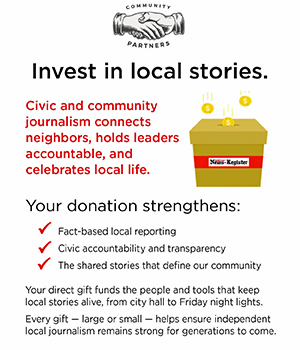Jeb Bladine: Creating need for affordable housing
Nobody testified at this week’s public hearing on the city of McMinnville’s 2019-20 budget.
No one asked about the $25 million general fund that pays for administration, finance, engineering, planning, police, municipal court, fire, parks & recreation, park maintenance and library. There were no questions or comments about $86 million in dedicated funds for communications, transportation, ambulance, sewer, streets, airport, park development, telecommunications, information systems and debt service.
City councilors didn’t hear a peep about spending $5.33 million for PERS pensions — a $900,000 increase over this year. Nothing was mentioned about the 5 percent surcharge in sewer rates — a $500,000 revenue bonus that likely is destined for the general reserve fund which has declined in recent years.
All that public silence left time for the City Council to debate an interesting budgeting paradox: How much transient room tax revenue should they spend on efforts to provide affordable housing?
McMinnville expects to collect at least $1.25 million in 2019-20 room taxes. Seventy percent, about $875,000, must be spent to promote or facilitate tourism, leaving an unrestricted $375,000 for the general fund. Options for spending that money remain under consideration, with early indications that $125,000 will be spent on the affordable housing project.
Here’s the paradox: When you spend nearly $900,000-and-growing to promote tourism, you rely more and more on a tourism-based economy. And what is the greatest economic challenge for people working in a tourism economy? Affordable housing!
It would make more sense to spend $375,000 promoting tourism and $900,000 on affordable housing. Current state law, however, mandates otherwise.
In fairness, McMinnville also budgets $60,000 for the McMinnville Economic Development Partnership, which works to bolster the local manufacturing economic that provides family-wage jobs. And this year, we are witnessing the initial stages of a new city venture called the MAC Town 2032 Economic Development Strategic Plan.
A new Economic Vitality Leadership Council will help guide development partners on numerous strategies, including this one: “Invest limited resources in strategic initiatives that create family wage jobs that are multi-generational and reinforce the small town charm of McMinnville.”
Importantly, instead of targeting more tourism growth, the MAC Town 2032 plan urges us to “Leverage the growing tourism industry toward new business development and investment.”
Kudos to the city for recognizing, and acting on, the tourism/housing budget paradox. Still, it remains to be seen how a struggling city budget will provide adequate resources for the expansive missions of MAC Town 2032.
Maybe someone will testify to that need at next year’s public hearing on the city budget.
Jeb Bladine can be reached at jbladine@newsregister.com or 503-687-1223.














Comments